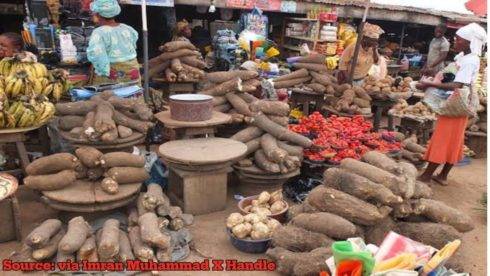Nigerian Economists reveal, the recent uptick in the value of the Nigerian naira relative to the US dollar has prompted economic analysts to delve into the potential ramifications for consumers, particularly regarding food prices. However, cautionary sentiments prevail among experts who suggest that this currency fluctuation may not directly translate into immediate relief at the checkout counter. Despite initial optimism, there’s a prevailing consensus that various factors, including supply chain dynamics and market forces, could temper any significant downward pressure on food prices in the near term.
Conversations within economic circles are abuzz with debates surrounding the anticipated effects of the naira’s appreciation on commodity prices nationwide. While some speculate that the strengthening currency could potentially mitigate inflationary pressures, others warn of the nuanced complexities within the Nigerian market that may delay or dilute this impact. This discourse underscores the intricacies of economic interplay and highlights the need for a nuanced understanding of the diverse factors shaping consumer experiences amidst currency fluctuations.
Insights from Nigerian Economists
One of the Nigerian Economists, In his remarks, Ayo Teriba, the CEO of Economic Associates, provides insightful analysis regarding the impact of currency appreciation on consumer prices. According to Teriba, despite recent currency appreciation, the prices of goods purchased at previous exchange rates are expected to remain stable. This stability, he explains, is attributed to the time lag between ordering and selling goods, which delays any noticeable changes in consumer prices. Teriba further emphasizes that the cessation of price escalation, or what he terms “acceleration,” is the primary effect to anticipate in the wake of currency appreciation.
Teriba’s explanation sheds light on the intricate dynamics at play within the economy, highlighting the importance of understanding the temporal aspects of supply chain management. His insights not only provide valuable guidance for businesses navigating currency fluctuations but also offer consumers a clearer understanding of how these changes may or may not affect their purchasing power. By focusing on the concept of “acceleration,” Teriba underscores the need for strategic planning and patience in assessing the full impact of currency appreciation on the cost of goods.
Nigerian Economists Gives Reasons in Delay in Price Adjustments
One of the Nigerian Economists, In his capacity as the President of the Nigerian Economic Society, Adeola Adenikinju has shed light on the intricacies of price adjustments within the economic landscape. Emphasizing the economic rationale behind the delay in altering prices, Adenikinju elucidates that businesses opt to maintain existing price points to prevent immediate losses. This strategy allows enterprises to exhaust their current inventory before acquiring new stock at adjusted exchange rates, thereby mitigating potential financial setbacks.
Adenikinju underscores that this process unfolds gradually, ensuring a smooth transition for both businesses and consumers. By elucidating the pragmatic approach adopted by businesses, Adenikinju offers insights into the nuanced dynamics governing price adjustments in response to fluctuating exchange rates. This comprehension is pivotal for stakeholders navigating the economic terrain, facilitating informed decision-making amid evolving market conditions.
Nigerian Economists: Global Economic Perspectives
One of the Nigerian Economists, in a compelling discourse, Professor Onakoya Adegbei, a distinguished faculty member of Babcock University’s Economics department, delved into the intricacies of the prevailing economic landscape. Shedding light on the conundrum of persistent price hikes amidst currency appreciation, Adegbei’s analysis unveiled a broader perspective extending beyond Nigeria’s borders. He astutely pointed out that this phenomenon is not confined to Nigeria alone but resonates across various global regions. Drawing upon economic theory, Adegbei elucidated the “expectation theorem,” which elucidates how consumer behavior and production dynamics are intricately intertwined with anticipations of future price fluctuations.
Adegbei’s elucidation of the “expectation theorem” illuminates the complexities underlying market dynamics, underscoring the profound impact of anticipatory behavior on economic trends. By recognizing the pervasive nature of this phenomenon, Adegbei provides invaluable insights for policymakers, businesses, and stakeholders navigating uncertain economic terrain. His analysis not only enhances our understanding of current market conditions but also underscores the imperative for strategic foresight and proactive decision-making in an ever-evolving economic landscape. Through his scholarly discourse, Adegbei reaffirms Babcock University’s commitment to fostering academic excellence and contributing to informed discourse on pressing economic issues.
Nigerian Economists: Lag Effect in Production and Pricing
In his insightful analysis, Adegbei, a prominent figure among Nigerian Economists, delves into the intricate nuances of production and pricing dynamics, shedding light on the phenomenon known as the lag effect. He astutely elucidates how alterations in production and subsequent price adjustments are often accompanied by a delay, owing to the inherent rigidity entrenched within production processes. Adegbei points out that manufacturers and suppliers habitually exercise caution, waiting to gauge the enduring nature of price fluctuations before recalibrating their production levels and pricing strategies in tandem.
By expounding on the temporal disjunction between production changes and corresponding price adjustments, Adegbei underscores the pragmatic challenges confronted by economic agents in navigating market fluctuations. His analysis underscores the imperative for businesses to adopt a nuanced understanding of the intricate interplay between production dynamics and pricing mechanisms, in order to formulate robust strategies that can effectively weather the uncertainties inherent in the market. Through his elucidation, Adegbei not only provides invaluable insights for economic practitioners but also offers a compelling narrative that resonates with scholars and policymakers seeking to comprehend and address the complexities inherent in contemporary economic landscapes.
Nigerian Economists Give Anticipated Shifts in Consumer Prices
In the wake of the naira’s appreciation against the dollar, Nigerian economists weigh in on its potential impact on commodity prices within the nation. While this development holds promise for stabilizing the economy, cautionary notes from economists urge consumers to manage their expectations regarding immediate price reductions. The intricacies of price dynamics, as highlighted by economic analysts, indicate that adjustments to currency fluctuations may not yield immediate results, emphasizing the importance of patience in anticipating significant shifts in prices over time.
The insights provided by economists underscore the transitional period businesses must navigate as they adjust to the new exchange rate. This transition is expected to influence the pricing strategies of goods and services, with consumers likely to experience fluctuations in costs as businesses adapt to the evolving currency landscape. Understanding the complexities involved in this process is crucial for consumers in managing their expectations and making informed decisions regarding purchasing behaviors amidst changing economic conditions in Nigeria.
Table of Contents
Discover more from OGM News NG
Subscribe to get the latest posts sent to your email.














